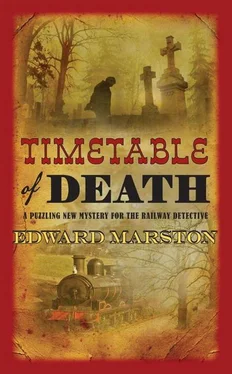Edward Marston - Timetable of Death
Здесь есть возможность читать онлайн «Edward Marston - Timetable of Death» весь текст электронной книги совершенно бесплатно (целиком полную версию без сокращений). В некоторых случаях можно слушать аудио, скачать через торрент в формате fb2 и присутствует краткое содержание. Год выпуска: 2015, ISBN: 2015, Издательство: ALLISON & BUSBY, Жанр: Исторический детектив, на английском языке. Описание произведения, (предисловие) а так же отзывы посетителей доступны на портале библиотеки ЛибКат.
- Название:Timetable of Death
- Автор:
- Издательство:ALLISON & BUSBY
- Жанр:
- Год:2015
- ISBN:9780749018122
- Рейтинг книги:4 / 5. Голосов: 1
-
Избранное:Добавить в избранное
- Отзывы:
-
Ваша оценка:
- 80
- 1
- 2
- 3
- 4
- 5
Timetable of Death: краткое содержание, описание и аннотация
Предлагаем к чтению аннотацию, описание, краткое содержание или предисловие (зависит от того, что написал сам автор книги «Timetable of Death»). Если вы не нашли необходимую информацию о книге — напишите в комментариях, мы постараемся отыскать её.
Timetable of Death — читать онлайн бесплатно полную книгу (весь текст) целиком
Ниже представлен текст книги, разбитый по страницам. Система сохранения места последней прочитанной страницы, позволяет с удобством читать онлайн бесплатно книгу «Timetable of Death», без необходимости каждый раз заново искать на чём Вы остановились. Поставьте закладку, и сможете в любой момент перейти на страницу, на которой закончили чтение.
Интервал:
Закладка:
‘It would be easier if you actually lived in Spondon,’ said Leeming. ‘You’ve been here every day so far.’
‘I like the place, Sergeant, and the local people seem to like me.’
‘Why do they have to talk in that weird language?’
‘Derbyshire folk are proud of their dialects,’ said Conway. ‘If they came to London, they wouldn’t be able to understand a word of Cockney slang.’
‘It takes getting used to.’
‘As for staying the night here, this may be my last visit to Spondon. The editor says I won’t be coming again.’
‘But you’ve turned up vital information.’
‘Somebody doesn’t want me here and spoke to my editor — Wigg, probably.’
Since it was Conway who’d told him about Wigg’s brother, Leeming felt obliged to say that he’d been to Belper and to give a short account of what he learnt there. The reporter was not surprised. Elijah Wigg only cultivated people who could be useful to him, such as the editor of the Derby Mercury . A pharmacist brother had no social or political leverage to offer.
‘As it happens, he was here last night,’ said Conway.
‘Superintendent Wigg?’
‘Yes, the stationmaster saw him arrive.’
‘Well, there’s no reason why he shouldn’t be,’ remarked Leeming. ‘He and his men are still supposed to be helping us with our enquiries though they’ve not given us much assistance so far.’
‘They work slowly but surely.’
‘I know. It takes them three years to solve a murder.’
‘The Stone case is still awaiting a solution.’
‘I wonder why,’ said Leeming with irony. ‘If he came here, Wigg would certainly have been in touch with Hockaday. Indeed, that may have been the main reason for his visit.’
‘You could be right, Sergeant — as long as you don’t ask me to confirm it by challenging him. I’m keeping out of Hockaday’s way.’
‘He can’t harm you, Mr Conway. He’d lose his position as a constable, for a start. We’ve had to get rid of a number of our men who are too ready to use their fists to pay off old grudges.’
‘Well, he certainly holds a grudge against me.’
‘It’s because you’re a threat. You might find out the truth about him.’
‘I’ll leave that job to you, Sergeant.’
After exchanging information with him for a few more minutes, Leeming took his leave and made his way to the cobbler’s shop. Hockaday was in the process of serving a customer. When the woman departed, he turned an unfriendly stare towards his visitor. The sergeant fired off his first question immediately.
‘Where did you go by train yesterday, Mr Hockaday?’
‘Why do you want to know?’
‘You don’t deny it, then?’
‘If you’ve been talking to the stationmaster again, he’ll have told you I caught a train. Is that how you spied on me?’
‘No, it isn’t,’ replied Leeming. ‘I happened to be sitting in the window of the Malt Shovel when you strode past. You were so eager to get somewhere that I wanted to know where it was. I followed you.’
The cobbler sounded hurt. ‘ I never saw you.’
‘I thought you were going to Duffield to warn the people whose names you’d given that they might get a visit from us. It looked as if you went to concoct an alibi.’
‘I didn’t need to,’ said the other, incensed.
‘I know that now, sir. Mr Verney confirmed your story and he struck me as an honest man. He told me that you did call there on the night of the murder but that it was late and you’d been drinking.’
‘I’m entitled to a pint of beer now and then.’
‘I agree. Where did you go before you visited Mr and Mrs Verney?’
‘That’s no concern of yours, Sergeant.’
‘Was it the same place you went to yesterday when you stayed on the train instead of getting off at Duffield?’
‘Why are you paying so much attention to me when there’s a killer on the loose?’ demanded the cobbler.
‘It’s because you’re concealing things from us, Mr Hockaday. For instance,’ said Leeming, ‘you didn’t tell us that you had family in Duffield. Mr Verney made sure that nobody overheard but he told me that you were his son. Is that true?’
Hockaday’s anger changed immediately to alarm. He suddenly looked very vulnerable. Reaching out, he grabbed Leeming by both arms.
‘Don’t tell anybody that,’ he pleaded. ‘People here don’t need to know it. I beg of you to keep it to yourself, Sergeant.’
Maurice Cope astounded him. Colbeck’s assumption was that the man was there to watch them as much as to conduct them around the works. In fact, Cope turned out to be as fascinated by trains as the inspector. His knowledge of the Midland Railway was almost encyclopaedic and he spoke with a muted passion. Most of the technical information was lost on Edward Tallis, who trailed behind the two men with mounting boredom.
‘When the Midland Railway was authorised in 1844,’ said Cope, ‘we inherited an assortment of locomotives from the constituent companies. There were 95 in all, plus 282 carriages, 1256 goods wagons and a number of horseboxes, post office vans and carriage trucks.’
‘The Midland Counties had tiny Bury locomotives,’ recalled Colbeck, ‘but the North Midland had those sturdy, sandwich-framed ones.’
‘So did the Birmingham and Derby Junction.’
‘Is all this relevant?’ wailed Tallis.
But the other two men ignored him. They were inspired by everything they saw, from the turning of the huge wheels on massive lathes to the riveting of the boilers and the ingenuity of the bending tubes. The pounding of the giant steam hammers made Tallis put his hands over his ears but the others took the hullaballoo in their stride. It was in the roundhouse that Colbeck simply stood and stared in awe. It was the largest structure of its kind in the whole country, with a turntable at its centre and a series of parking bays running off it like the spokes of a wheel. There was a fearsome compound of smells and sounds. Cope indicated points of interest and Colbeck evinced an almost childish glee.
‘How much longer is this going on?’ complained Tallis.
‘You may leave if you wish,’ said Colbeck.
‘I thought we came here to learn something.’
‘We’ve learnt dozens of things, Superintendent.’
‘All that I’ve learnt is that it was an act of madness to accompany you. The stink is unbearable and I think my eardrums are perforated. How can anyone work in such appalling conditions?’
‘Employees adapt very quickly, sir,’ said Cope. ‘Apprentices start as young as thirteen years of age. They work an eight-hour day and are controlled by a steam whistle. Only when it rings for the sixth time can they end their shift.’
‘It makes our day seem soft by comparison,’ said Colbeck.
‘Nonsense!’ exclaimed Tallis. ‘We work longer hours and often have to be on duty all night. Also, I should remind you, we face danger on a daily basis.’
‘So do the employees here.’
‘It’s true,’ said Cope, sadly. ‘We have far too many accidents. Railway workers need to keep their wits about them. Some men have been incapacitated for life, and I’m ashamed to admit that we’ve had fatalities.’
‘You’ll have another if I have to stay here any longer,’ grumbled Tallis.
‘At least stay to see the turntable in action,’ urged Colbeck.
‘I’ve seen enough.’
‘There’s something I’ve always wanted to do.’
‘I think I can guess what it is, Inspector,’ said Cope. ‘Give me a moment and I’ll arrange for your wish to be fulfilled.’
‘What’s this about a wish?’ asked Tallis.
After removing his hat and his coat, Colbeck handed them to him.
Читать дальшеИнтервал:
Закладка:
Похожие книги на «Timetable of Death»
Представляем Вашему вниманию похожие книги на «Timetable of Death» списком для выбора. Мы отобрали схожую по названию и смыслу литературу в надежде предоставить читателям больше вариантов отыскать новые, интересные, ещё непрочитанные произведения.
Обсуждение, отзывы о книге «Timetable of Death» и просто собственные мнения читателей. Оставьте ваши комментарии, напишите, что Вы думаете о произведении, его смысле или главных героях. Укажите что конкретно понравилось, а что нет, и почему Вы так считаете.












